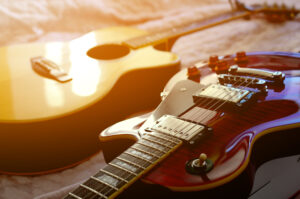Selecting an ideal first guitar sets the tone for early lessons. Knowing how to select the best guitar for a beginner means balancing comfort, quality, and motivation. Here’s a clear, structured approach to choosing a guitar that supports long-term enjoyment and progress.
What Beginners Should Look For
- Comfort and playability
- Look for low string action (light tension) and a narrow neck—especially important for smaller hands or younger players.
- Size matters
- For children under 12, a ¾-size or ½-size guitar helps build strength and proper hand posture. Full-size guitars are fine for teens and adults.
- Sound quality and durability
- Wooden top (spruce or cedar) models have richer tone than laminated ones. Look for solid construction and sturdy tuning pegs.
- Budget range
- Expect to spend $150‑$300 for a good starter acoustic. Quality at this range outperforms most $50‑$100 models.
Suggested Features and Shopping Tips
| Feature | Why It Matters | Recommendation |
|---|---|---|
| Acoustic focus | Builds ear training and touch sensitivity | Choose a reliable acoustic if budget allows. |
| Included tuner/case | Helpful for beginners | Many starter packs come with useful accessories |
| Local trial option | Allows feel and sound testing | Try before you buy at a local shop when possible |
If you’d like to develop musicianship beyond chords, you’ll find our techniques in reading chord charts help reinforce harmonic understanding when working through song patterns.
Why Smart Gear Selection Helps Students
- Boosts practice consistency: A comfortable guitar is more inviting to pick up daily.
- Fosters motivation: Early success with chords and melodies helps cement commitment.
- Avoids poor habits: Guitars that buzz or are hard to hold can lead to tension or discouragement.
According to beginner gear reviews on Guitar World, models in the $150–$400 range that offer solid tops and easy setup deliver balanced tone and feel—ideal for early learners.
FAQ – Buying Smarter for Beginners
Q: Should I go acoustic or electric?
A: Acoustic guitars are ideal for most beginners—they build finger strength and require minimal gear. Electric guitars can be appropriate if the student is rock-focused and has access to an amp.
Q: Is it better to buy new or used?
A: A well-maintained used guitar in one of the recommended models is perfectly fine. Try before you buy and check for buzzing strings or worn frets.
Q: Does brand matter at first?
A: Not as much as playability and comfort. Reliable beginner starter brands like Yamaha, Fender, and Ibanez often deliver better consistency than unknown no-brand guitars.
